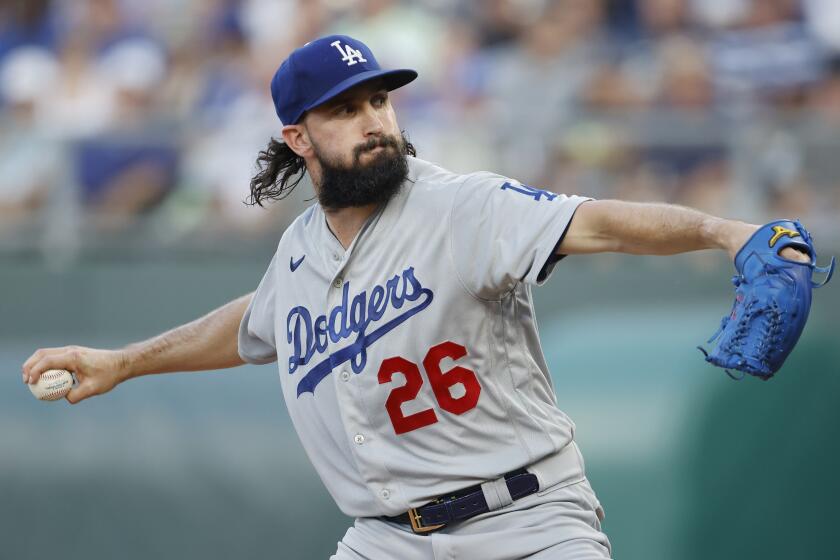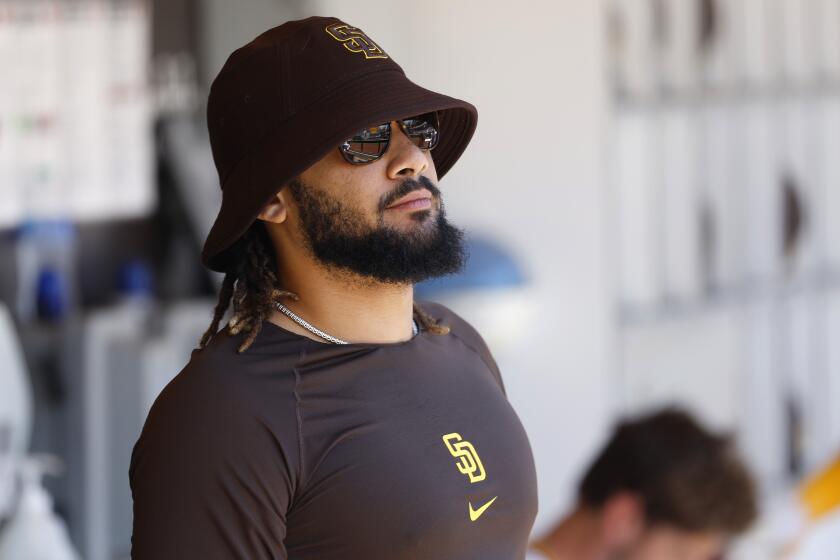Dodgers make it a day to remember with Negro Leagues museum visit and 12th consecutive win
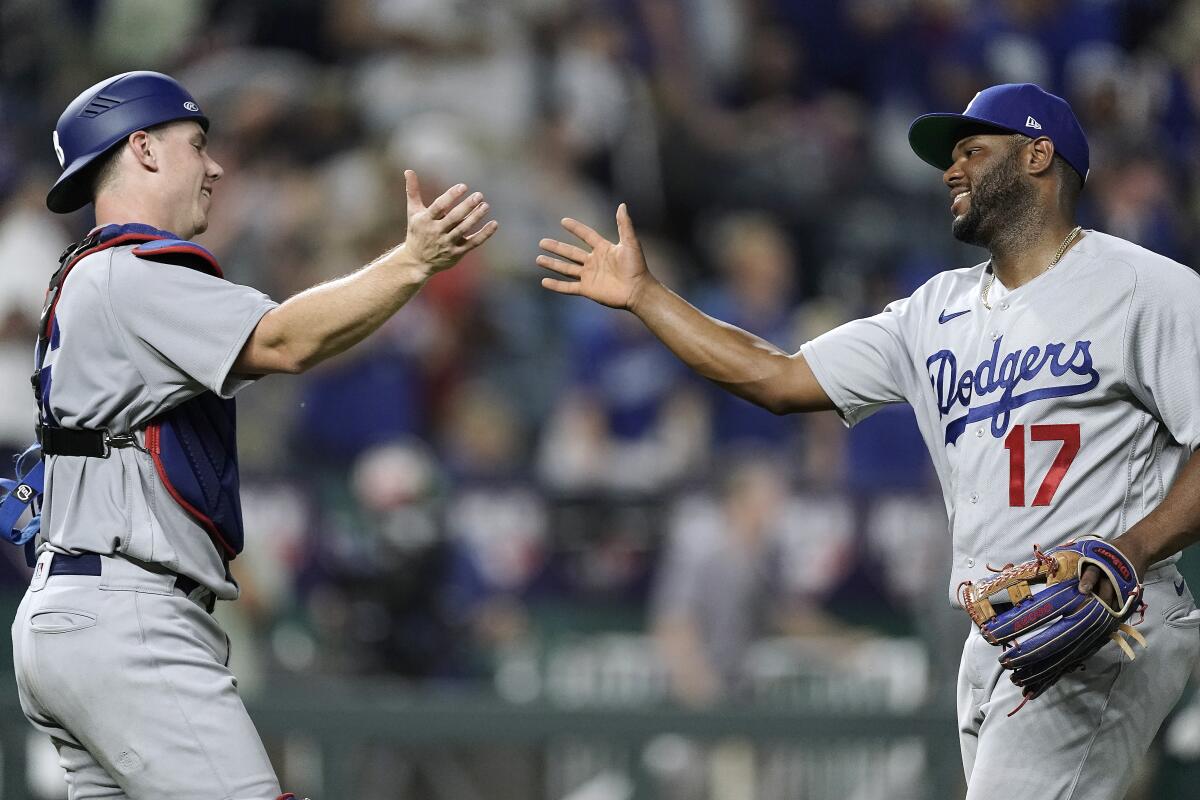
- Share via
KANSAS CITY, Mo. — A day brimming with an appreciation for the past eventually had the Dodgers cherishing the present and peering excitedly into a future that gets more promising with every game. Call it a win, win, win.
History lessons abounded, but not the dry, academic kind. These, by all accounts, were gripping and profoundly meaningful tales.
Saturday morning was spent touring the Negro Leagues Baseball Museum while listening to the captivating narration of museum president and master storyteller Bob Kendrick.
From the exploits of Satchel Paige and Cool Papa Bell to the Negro League debuts of future major league Hall of Famers Hank Aaron, Roy Campanella and Willie Mays, to the shocking segregation and second-class treatment of the teams and their fans from 1920 to 1960, Kendrick emphasized that the story of the Negro Leagues “isn’t about adversity. It is about what they did to overcome that adversity.”
Clayton Kershaw was one of about a dozen Dodgers players who took the tour along with manager Dave Roberts, coaches, media members and dozens of fans wearing Dodgers gear who showed up because they could rub elbows with their heroes but soon became engrossed by Kendrick’s narrative.
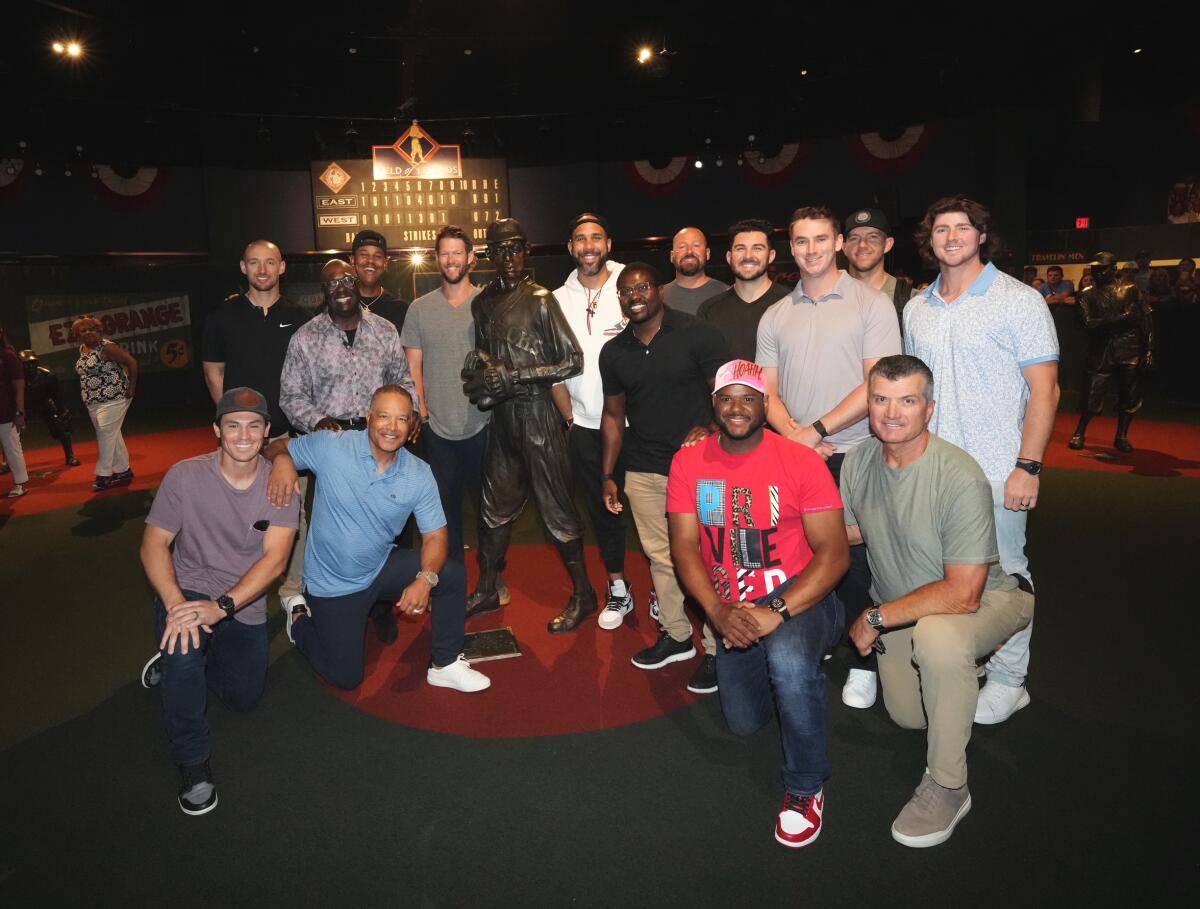
“A lot of the history of the Negro Leagues isn’t talked about, which I think is sad, but then it also makes it really cool that [the museum] is here,” Kershaw said. “I was grateful I got to learn a lot of that history because I didn’t know hardly any of it.”
Evening rolled around with nods to the 75th anniversary of Jackie Robinson breaking the color barrier and the late Negro Leagues legend Buck O’Neil’s Hall of Fame induction. The Dodgers wore 1955 Brooklyn uniforms and the Royals donned the 1945 uniforms of the Negro League power Kansas City Monarchs, whom Robinson played for before the Dodgers signed him.
Oh, then a game began, and that had a historical aspect as well. The Dodgers smothered the Royals early and coasted to a 13-3 win, their 12th in a row, three shy of the franchise record of 15 set in 1924 when the team was called the Brooklyn Robins.
Mookie Betts led off the first inning with his 26th home run and the Dodgers scored five runs before an out was recorded. They tacked on two in the second on Will Smith’s home run, another in the third on Gavin Lux’s home run and two more in the fourth on Max Muncy’s home run.
Tony Gonsolin was perfect through 5 1/3 innings and took a no-hitter into the seventh against the Royals as the Dodgers won their 11th in a row.
The season-high crowd of 29,689 at Kauffman Stadium had hardly settled into their seats and the Royals were already, well, history.
The onslaught continued in the ninth when Joey Gallo and Cody Bellinger hit back-to-back blasts off position player Nicky Lopez, giving the Dodgers six in the game. Muncy had four of the Dodgers 16 hits, Betts had three and Smith and Lux each had two.
The Dodgers have scored eight or more runs in eight of the 12 consecutive wins. Is this the best the offense has performed in recent memory?
“As far as how we are winning games, from the get-to, sustaining leads, the lineup one through nine, this is as good as I’ve seen,” Roberts said.
The Dodgers were given a scare when injury-prone starter Andrew Heaney was drilled in the left biceps by Bobby Witt Jr.’s line drive with one out in the third inning. Heaney struck out the next two batters but was replaced by Caleb Ferguson to begin the fourth after being diagnosed with a contusion.
“There wasn’t much reason to keep him out there,” Roberts said. “He was fighting to stay in, which is a good thing. I expect him to make his next start.”
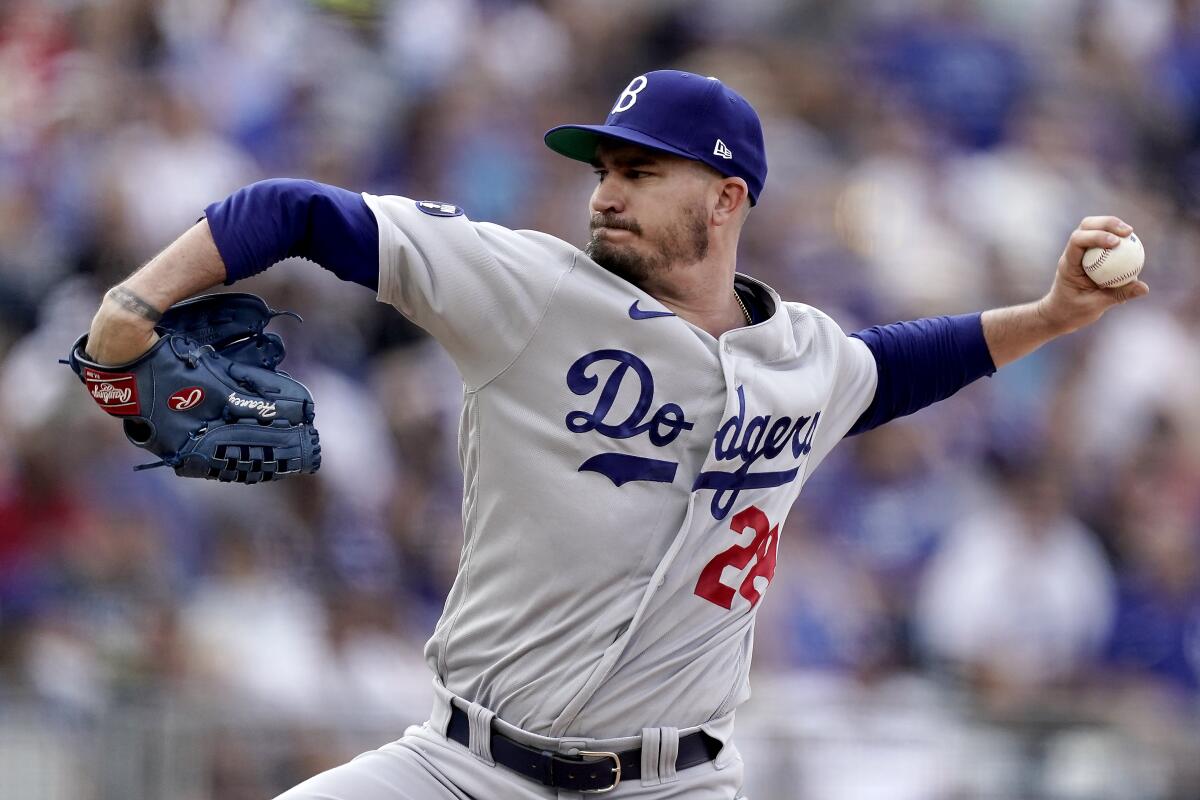
Tyler Anderson (13-1) will start Sunday in the series finale and the Dodgers fully expect to extend the win streak to 13, which the team accomplished in 1962 and 1965.
The 15 consecutive wins in 1924 offered another tantalizing peek into the past. The last 10 victories were played in six days to compensate for postponed games. Two future Hall of Famers played major roles: Dazzy Vance pitched two complete games and Zach Wheat batted .406 during the streak.
The Dodgers are within striking distance of that franchise record but are a long way from the MLB-record 26 wins in a row by the New York Giants in 1916 or even the 22 in a row won by Cleveland in 2017.
Pulling the lens back to view the entire season does nothing to diminish the Dodgers’ accomplishments. Their 79-33 record puts them on pace to finish 114-48, a winning percentage of .704. The record for victories in a season is 116, held by the 1906 Chicago Cubs and 2001 Seattle Mariners.
Since MLB went to a 162-game schedule in 1962, only three teams have finished with a winning percentage over .700: The aforementioned Mariners (.716), the 1998 New York Yankees (114-48; .704) and the 2020 Dodgers, who were 43-17 for a .717 winning percentage in the pandemic-shortened season that ended with their World Series championship.
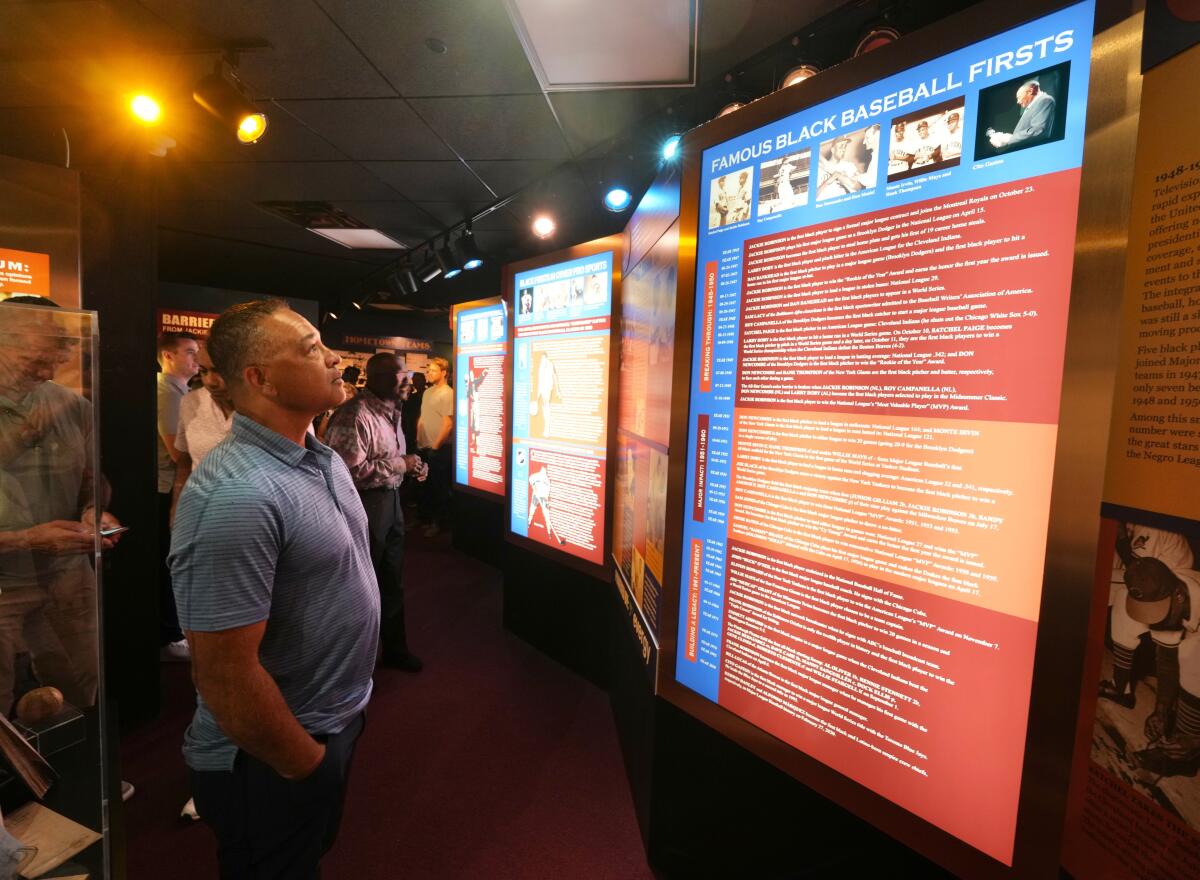
Because of inconsistent record-keeping, it’s unclear how many — if any — Negro League teams won at a comparable clip. For the Dodgers, however, numbers took a backseat to uplifting anecdotes and accomplishments relayed by Kendrick during the museum tour.
“These players knew full well they were talented enough to play in the major leagues, but they weren’t allowed,” Kendrick told the Dodgers contingent. “By the time you bear witness to everything they had to endure, you will understand.”
For Kirsten Watson, a Black Dodgers’ SportsNet LA reporter and studio host, the museum visit confirmed a story passed down in her family, that her great-great-grandfather Frank Miller played on the first all-Black professional baseball team. There it was, a team photo of the Cuban Giants from 1885, and there was Miller, his name stitched across his jersey. Watson yelped in delight and got a high-five from Roberts.
A description next to the photo clarified that the term “Cuban” was meant to fool whites into believing they were Latin American players, reducing the chances of the team being persecuted. The team was formed in Philadelphia and hired to play as summer entertainment for guests at the Argyle Hotel in Long Island.
Padres superstar Fernando Tatis was suspended 80 games by MLB for testing positive for a banned substance. He won’t play this season.
For Dodgers reliever Alex Vesia, the experience was enthralling. “My favorite players growing up were David Price, CC Sabathia, guys that have impacted my life significantly. To learn about these Black players they looked up to, that’s important to me.”
For Price, a veteran Black pitcher who first visited the museum while playing for Team USA in 2005 and has returned many times since, it was gratifying to witness teammates take to heart the travails Black players endured not so long ago.
“That’s why we go and why we come back, to expand our minds and learn about the past of what the Negro League guys went through,” he said.
And for Roberts, a history major at UCLA who is of Black and Japanese descent and the first minority to manage the Dodgers, most impressive was “the spirit of the Negro Leagues.”

“In talking to Buck O’Neil and Hank Aaron, it’s clear there wasn’t animosity,” Roberts said. “When you think of segregation, you think of anger and animosity, and these players endured that turmoil, the racism, the segregation, but they didn’t let it deter their joy of performing the game they love.”
The popular Field of Dreams game in Iowa won’t take place next season because the stadium will be under construction. There is talk of replacing it with a nod to the Negro Leagues, perhaps a game held in Birmingham or Mobile, Ala. Roberts is all for it.
“We can’t push this game forward and sustain it with real substance if we can’t appreciate the history of the game,” he said. “Talking about the Field of Dreams, the Negro Leagues and talking about Jackie Robinson and Buck O’Neil, it’s important that we continue to do that.”
More to Read
Are you a true-blue fan?
Get our Dodgers Dugout newsletter for insights, news and much more.
You may occasionally receive promotional content from the Los Angeles Times.
